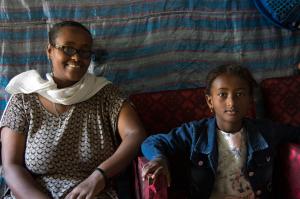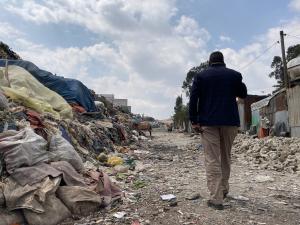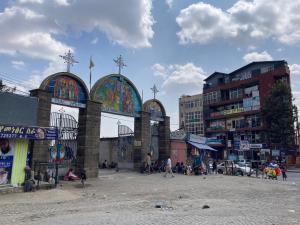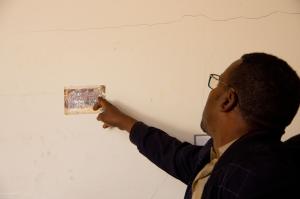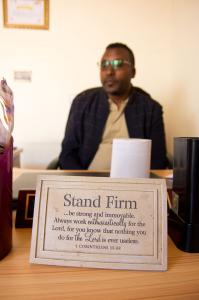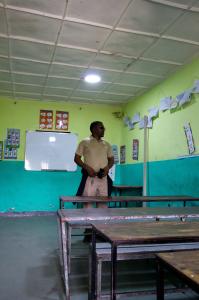Holding your head high: Korah kids of Ethiopia
By Tohru Inoue | Ethiopia in East Africa

Abera sitting on Steve
Abera sat on Steve’s lap and joked around. There weren’t enough seats, so Abera took matters in his own hands and plonked himself down. It was a real friendship moment.
We were visiting Tringo, a cook at the Bridge School, in Ethiopia’s capital Addis Ababa, Abera started almost a decade ago. Steve, an SIM mission worker, is a board member of the school.
It’s January 8, during the orthodox long Christmas weekend. To celebrate, Tringo’s daughter, Redeit (10), is wearing a pretty, white dress with pink and blue floral patterns and a jean jacket. Christmas is always an opportunity to wear your Sunday best. The little girl is sitting in a chair that looks like it could swallow her. The armrests come all the way up to her shoulders. Her eyes are very bright, very sharp. She’s sitting confidently with one arm on each armrest. I offered to take a mother-daughter Christmas picture for them. Redeit stared straight at the camera. She looked like SHE knew who she was. She was the queen, and mom sat contented by her side. It was a good picture.
It might surprise you that this lighthearted moment took place in a single-roomed, corrugated sheet-metal house in the midst of the Ethiopian capital’s main landfill. We’re in Korah in the Ethiopian capital Addis Ababa. The place is also referred to as Koshe which means “dirty” in Amharic.
The smell is overpowering. It’s a pungent, sour, fermented smell mixed with sewage. We walked a short distance through a rubbish-strewn narrow path. You can often smell the landfill several blocks away. Hundreds of families live here and make their living sifting through the trash heap. Men and boys tackle the multi-story mass and sort things to sell and things to eat. The rubbish mound is so high that, back in 2017, a ‘landslide’ of garbage killed hundreds of people, some whose bodies have never been recovered.
More than 80 years ago, the government gave the Korah area to those affected by leprosy. They lived on the outskirts of the city where all the “undesirables” ended up. In 1964, as the city grew, it also became the place where the city rubbish was dumped. Today, you can see the birds hovering over the great tower from far and wide.
This is where Abera grew up.
His father and mother both had leprosy. As the disease progressed, Abera’s father became blind and lost both feet below the ankles. Abera used to take him around from church to church to sit by the gate and ask for alms. He dutifully sat next to his father as his guide. People who knew him would occasionally give him some money or bread. Abera remembers taking his father to various orthodox churches, following the cycle of celebrations. Here for the celebration of the angel Michael, and there for the celebration of the angel Gabriel. Even today you’ll spot those affected by the disease huddled near church gates, walking stick in hand, and led by young children. While others his age went to school, Abera spent his primary school years accompanying his father and depending on the charity of the faithful.
His family story includes a lot of heartache. He told it to me without making much eye contact. His brother had mental health issues and his sister got pregnant after missing out on secondary school. During her second pregnancy, she and her baby contracted HIV. Being the only able body in the family, Abera had to forfeit his childhood to help win bread for the family.
But the Lord was with him. He sees it now.
Along the way, a church connected him to a sponsor and he managed to start school. He was determined to make up for lost time but there were some difficult years ahead. His father and both his siblings died, leaving his mother. He persevered through the grief and got an opportunity to be a teaching assistant at a language school. He was earning a steady income in a steady job. Though the money wasn’t much, Abera told me this part of the story while looking me straight in the eye.
Then the big break: he landed an Amharic language teaching job at Bingham Academy, SIM’s international mission school. It was the golden ticket! He started earning good money and added to that by tutoring foreigners. Things had finally turned around for him. He could have coasted along in that career, but for the tug at his heart. He had succeeded but individual success wasn’t enough. He had a burden for the kids who were still forfeiting their childhoods to make a living on the trash heap. After all, he still lived in the same neighbourhood and saw them every morning leaving for work and every evening coming home.
So, he gave his job up to start the Bridge School and Korah Kids right in the same community. The school helps bridge the knowledge gaps so that children who have never gone to school can be integrated into the formal school system. It helps them catch up in literacy, numeracy, Bible and arts. And Korah Kids helps sponsor children and their families by catering to the entire family’s needs making up for any income the families might have earned from their children scouring the rubbish tip. Families don’t have to worry about their finances and can allow their children to learn freely.
This change in Abera’s work wasn’t without protests. Even his family members thought he was throwing away a perfectly good job for a ministry with potentially irregular funding cycles. But Abera is strengthened by his favourite verse. It’s an obscure one from Deuteronomy.
“There is none like God, O Jeshurun,
Who rides through the heavens to your help,
Through the skies in his majesty.”
-Deuteronomy 33:26
It’s from Moses’ final blessing for the people. Moses was also a man who helped his own people and endured much sorrow.
And Abera identifies with the God who “rides through the heavens to your help”. He’s experienced that help. There was no one like that God. Abera persevered and God has given him an opportunity to help people overcome their situation. It’s a call that was born out of his own experiences. And he’s been able to see how it’s changed people.
I asked him what gave him the most pride. Looking me straight in the eye, he answered that the ministry employed some 20 people. He was giving livelihoods to people in the community: a steady job. He had also seen kids who have gone through the ministry go out in the world and find gainful employment. They can stand tall and tell their peers, making full eye contact, that they have job they feel good about. He also smiles when he thinks about a Bridge School student who joined the government school and was top of her class of 65 students.
It’s a demanding ministry. The weight of the needs routinely outmatches the resources. It’s hard to keep your head above water with all the finances. But the moments of levity between Abera, Steve and Tringo in the middle of Korah show how grounded the ministry is, how stable it makes me feel like the ministry is grounded. Abera is pursuing this call in a genuine and mentally and emotionally sustainable way. As we visit it’s clear Abera is friends with all his colleagues. It conveys the feeling that, “we’re all in this together,” whether director, board member or cook.
Today, the Bridge School has 20 students ranging from 9-17 years old. Korah Kids also sponsors 54 children. Those children are all like Redeit.
That picture of Tringo and Redeit shows the impact of this ministry. Abera is here so children like Redeit can sit up straight in their chair, heads held high. That they can put both arms on the armrest and look you straight in the eye and pose with confidence. They are learning that no matter where they started in life, they’re important. They’re learning that, even as they grow up amid the rubbish of Addis, they are made in God’s image.
And that’s something worth celebrating.
Pray:
• That the Lord would provide the financial shortfalls this year to run the Bridge School (roughly $3,500 USD/month). [give through “Korah Kids” project 092109]
• That the children would continue to grow in knowledge of the world around them and God.
• For wisdom for Abera and the team.
• For more workers and volunteers in this harvest field.
Related stories

Seven dental therapists graduate in Liberia, marking a milestone for dental care
Just three hours outside Monrovia, seven dedicated students, beaming with pride, celebrated their graduation alongside their teacher, Dr. Simon Stretton-Downes OBE. They are: Matilda, Archie, Daniel, Charles, Ellen, Rebecca and Vestee. After two years of hard work and collaboration, they received their Dental Therapy Practitioner diplomas from Cuttington University in Liberia. This is a significant milestone, marking a life-changing step for these students as they begin their new careers and a pivotal achievement for the country.


